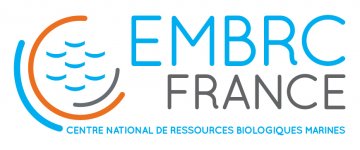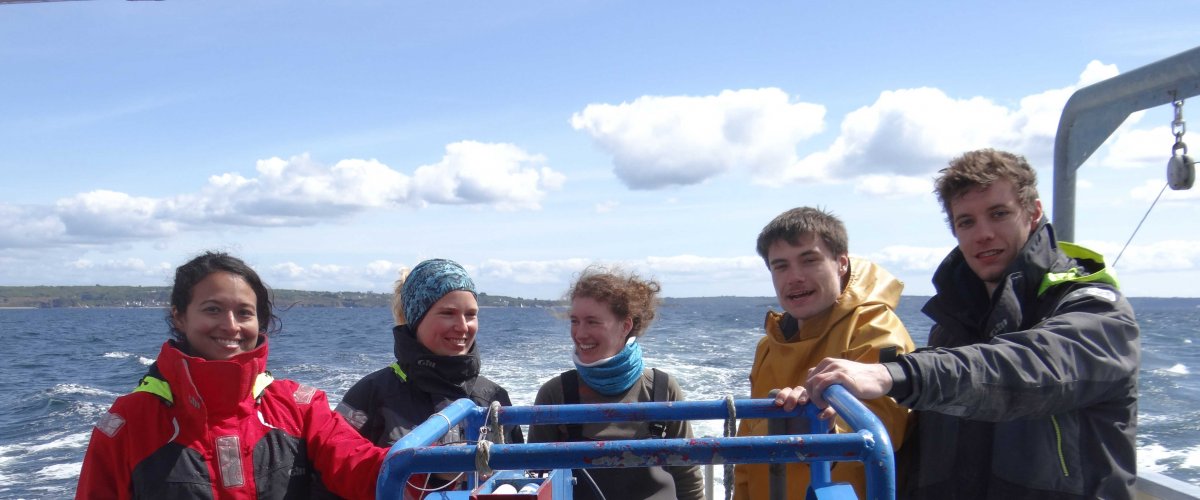Sophie MARTIN
Chargé(e) de recherche CNRS

Axes de recherche
- Cycle du carbone et des carbonates en milieu côtier (de l'échelle de l'organisme à l'échelle de l'écosystème)
- Structure et fonctionnement des communautés benthiques
- Réponse des organismes benthiques aux perturbations environnementales d’origine anthropique
Mission
Chargée de recherche au CNRS depuis 2009, ma thématique de recherche actuelle concerne les impacts des changements globaux (acidification des océans et réchauffement global) et locaux (eutrophisation) sur les organismes et communautés benthiques des écosystèmes tempérés, avec un intérêt particulier pour les écosystèmes dominés par les macroalgues.
PARCOURS
- Depuis Octobre 2009 : Chargée de recherche au Laboratoire Adaptation et Diversité en Milieu Marin (AD2M), Roscoff, France
- 2007 - 2009 : Post-doctorat au Radioecology Laboratory, Marine Environment Laboratories, International Atomic Energy Agency (IAEA), Monaco
- 2006 - 2007 : Post-doctorat au Laboratoire d'Océanographie de Villefranche (LOV), Villefranche-sur-mer, France
- 2002 - 2005 : Thèse de doctorat au Laboratoire des Sciences de l'Environnement Marin (LEMAR), Plouzané, France
Publications
2024
Bulleri F., Schubert N., Hall-Spencer J.M., Basso D., Burdett H.L., Francini-Filho R.B., Grall J., Horta P.A., Kamenos N.A., Martin S., Nannini M., Neves P., Olivé I., Peña V., Ragazzola F., Ribeiro C., Rinde E., Sissini M., Tuya F., Silva J. (2024). Positive species interactions structure rhodolith bed communities at a global scale. Biological Reviews,
https://doi.org/10.1111/brv.13148
Petton S., Pernet F., Le Roy V., Huber M., Martin S., Macé É., Bozec Y., Loisel S., Rimmelin-Maury P., Grossteffan É., Repecaud M., Quemener L., Retho M., Manac'h S., Papin M., Pineau P., Lacoue-Labarthe T., Deborde J., Costes L., Polsenaere P., Rigouin L., Benhamou J., Gouriou L., Lequeux J., Labourdette N., Savoye N., Messiaen G., Foucault E., Ouisse V., Richard M., Lagarde F., Voron F., Kempf V., Mas S., Giannecchini L., Vidussi F., Mostajir B., Leredde Y., Alliouane S., Gattuso J. P., Gazeau F. (2024) French coastal network for carbonate system monitoring: the CocoriCO2 dataset. Earth System Science Data, 16 (4): 1667-1688.
doi.org/10.5194/essd-16-1667-2024
Roussel S., Coheleach M., Martin S., Day R., Badou A., Huchette S., Dubois P., Servili A., Gaillard F., Auzoux-Bordenave S. (2024) From reproductive behaviour to responses to predators: Ocean acidification does not impact the behaviour of an herbivorous marine gastropod. Science of The Total Environment, 907: 167526.
doi.org/10.1016/j.scitotenv.2023.167526
Schubert N., Tuya F., Peña V., Horta P.A., Salazar V.W., Neves P., Ribeiro C., Otero-Ferrer F., Espino F., Schoenrock K., Ragazzola F., Olivé I., Giaccone T., Nannini M., Mangano M.C., Sará G., Mancuso F.P., Tantillo M.F., Bosch-Belmar M., Martin S., Le Gall L., Santos R., Silva J. (2024). “Pink power” — the importance of coralline algal beds in the oceanic carbon cycle. Nature Communications, 15(1): 8282.
https://doi.org/10.1038/s41467-024-52697-5
2023
Dorey N., Martin S., Kwiatkowski L. (2023) Ocean acidification enhances primary productivity and nocturnal carbonate dissolution in intertidal rock pools. Biogeosciences, 20 (20): 4289–4306.
doi.org/10.5194/bg-20-4289-2023
Martin S., Calvert V., Chenuil A. (2023) Physiological differences among cryptic species of the Mediterranean crustose coralline alga Lithophyllum stictiforme (Corallinales, Rhodophyta). European Journal of Phycology, 59 (2): 184–195.
doi.org/10.1080/09670262.2023.2281484
Petton S., Pernet F., Le Roy V., Huber M., Martin S., Macé E., Bozec Y., Loisel S., Rimmelin-Maury P., Grossteffan E., Repecaud M., Quéméner L., Retho M., Manach S., Papin M., Pineau P., Lacoue-Labarthe T., Deborde J., Costes L., Polsenaere P., Rigouin L., Benhamou J., Gouriou L., Lequeux J., Labourdette N., Savoye N., Messiaen G., Foucault E., Lagarde F., Richard F., Ouisse V., Voron F., Mas S., Giannecchini L., Vidussi F., Mostajir B., Leredde Y., Kempf V., Alliouane S., Gattuso, J.-P., Gazeau F. (2023) French coastal carbonate dataset from the CocoriCO2 project. Seanoe.
doi.org/10.17882/96982
Tuya F., Schubert N., Aguirre J., Basso D., Bastos E., Berchez F., Bernardino A., Bosch N., Burdett H., Espino F., Fernandez-Garcia C., Francini-Filho R., Gagnon P., Hall-Spencer J., Haroun R., Hofmann L., Horta P., Kamenos N., Le Gall L., Magris R., Martin S., Nelson W., Neves P., Olivé I., Otero-Ferrer F., Peña V., Pereira-Filho G., Ragazzola F., Rebelo A.C., Ribeiro C., Rinde E., Schoenrock K., Silva J., Sissini M., Tamega F. (2023) Levelling-up rhodolith-bed science to address global-scale conservation challenges. Science of The Total Environment, 892:164818.
doi.org/10.1016/j.scitotenv.2023.164818
2022
Auzoux-Bordenave S., Ledoux A., Martin S., Di Poi C., Suquet M., Badou A., Gaillard F., Servili A., Le Goïc N., Huchette S., Roussel S. (2022) Responses of early life stages of European abalone (Haliotis tuberculata) to ocean acidification after parental conditioning: Insights from a transgenerational experiment. Marine Environmental Research, 181(1):105753.
doi.org/10.1016/j.marenvres.2022.105753
Kavousi, J., Roussel, S., Martin, S., Gaillard, F., Badou, A., Di Poi, C., Huchette, S., Dubois, P. & Auzoux-Bordenave, S. (2022). Combined effects of ocean warming and acidification on the larval stages of the European abalone Haliotis tuberculata. Marine Pollution Bulletin, 113131.
doi.org/10.1016/j.marpolbul.2021.113131
Qui Minet Z.N., Davoult D., Grall J., Martin S. (2022). The relative contribution of fleshy epiphytic macroalgae to the production of temperate maerl (rhodolith) beds. Marine Ecology Progress Series, 693: 69-82.
doi.org/10.3354/meps14089
2021
Auzoux-Bordenave S., Chevret S., Badou A., Martin S., Di Giglio S., Dubois P. (2021). Acid–base balance in the hæmolymph of European abalone (Haliotis tuberculata) exposed to CO2-induced ocean acidification. Comparative Biochemistry and Physiology Part A: Molecular & Integrative Physiology, 259: 110996.
doi.org/10.1016/j.cbpa.2021.110996
Qui Minet Z.N., Davoult D., Grall J., Delaunay C., Six C., Cariou T., Martin S. (2021) Physiology of maerl algae: Comparison of inter‐ and intraspecies variations. Journal of Phycology, 57(3): 831-848.
doi.org/10.1111/jpy.13119
2020
Auzoux-Bordenave S., Wessel N., Badou A., Martin S., M’Zoudi S., Avignon S., Roussel S., Huchette S., Dubois P. (2020). Ocean acidification impacts growth and shell mineralization in juvenile abalone (Haliotis tuberculata). Marine Biology, 167, 11.
doi.org/10.1007/s00227-019-3623-0
Avignon S., Auzoux-Bordenavel S., Martin S., Dubois P., Badou N., Coheleach M., Richard N., Di Giglio S., Malet L., Servili A., Gaillard F., Huchette S. & Roussel S. (2020) An integrated investigation of the effects of ocean acidification on adult abalone (Haliotis tuberculata). ICES Journal of Marine Science, 77: 757-772.
doi.org/10.1093/icesjms/fsz257
Legrand E., Martin S., Leroux C. & Riera P. (2020) Using stable isotope analysis to determine the effects of ocean acidification and warming on trophic interactions in a maerl bed community. Marine Ecology, 2020: e12612: 1-13.
doi.org/10.1111/maec.12612
2019
Legrand E., Riera P., Lutier M., Coudret J., Grall J., Martin S. (2019) Grazers increase the sensitivity of coralline algae to ocean acidification and warming. Journal of Sea Research, 148-149: 1-7.
doi.org/10.1016/j.seares.2019.03.001
Qui Minet Z.N., Coudret J., Davoult D., Grall J., Mendez-Sandin M., Cariou T. & Martin S. (2019) Combined effects of global climate change and nutrient enrichment on the physiology of three temperate maerl species. Ecology & Evolution, 9(24): 13787-13807.
doi.org/10.1002/ece3.5802
Rindi F., Braga J. C., Martin S., Peña V., Le Gall L., Caragnano A. and Aguirre J. (2019) Coralline Algae in a Changing Mediterranean Sea: How Can We Predict Their Future, if We Do Not Know Their Present? Frontiers in Marine Science, 6: 723.
doi.org/10.3389/fmars.2019.00723
2018
Dorey N., Martin S., Oberhänsli F., Teyssié J.−L., Jeffree R., Lacoue−Labarthe T. (2018) Ocean acidification modulates the incorporation of radio−labeled heavy metals in the larvae of the Mediterranean sea urchin Paracentrotus lividus. Journal of Environmental Radioactivity, 190−191: 20−30.
doi.org/10.1016/j.jenvrad.2018.04.017
Lacoue−Labarthe T., Oberhänsli F., Teyssié J.−L., Martin S. (2018) Delineation of metals and radionuclides bioconcentration in eggs of seabream Sparus aurata and effect of environmental pCO2. Journal of Environmental Radioactivity, 192: 426−433.
doi.org/10.1016/j.jenvrad.2018.07.010
Legrand E., Martin S., Leroux C., Riera P. (2018) Effect of temperature on an alga−grazer trophic interaction: a dual stable isotope (13C, 15N) labeling experiment. Marine Ecology, e12495.
doi.org/10.1111/maec.12495
Legrand E., Riera P., Bohner O., Derrien M., Schlicklin F., Coudret J., Martin S. (2018) Impact of ocean acidification and warming on the productivity of a rock pool community. Marine Environmental Research, 136: 78−88. https://doi.org/10.1016/j.marenvres.2018.02.010
Legrand E., Riera P., Pouliquen L., Bohner O., Cariou T., Martin S. (2018) Ecological characterization of intertidal rockpools: Seasonal and diurnal monitoring of physico-chemical parameters. Regional Studies in Marine Science 17: 1-10.
doi.org/10.1016/j.rsma.2017.11.003
Qui−Minet Z., Delaunay C., Grall J., Six C., Cariou T., Bohner O., Legrand E., Davoult D., Martin S. (2018) The role of local environmental changes on maerl and its associated noncalcareous epiphytic flora in the Bay of Brest. Estuarine, Coastal and Shelf Science, 208: 140−152.
doi.org/10.1016/j.ecss.2018.04.032
Wessel N., Martin S., Badou A., Dubois P., Huchette S., Julia V., Nunes F., Harney E., Paillard C., Auzoux−Bordenave S. (2018) Effect of CO2–induced ocean acidification on the early development and shell mineralization of the European abalone (Haliotis tuberculata). Journal of Experimental Marine Biology and Ecology, 508: 52−63.
doi.org/10.1016/j.jembe.2018.08.005
2017
Martin S., Hall-Spencer J.M. (2017) Effects of Ocean Warming and Acidification on Rhodolith/Maërl Beds. In: Riosmena-Rodríguez R., Nelson W., Aguirre J. (eds) Rhodolith/Maërl Beds: A Global Perspective. Springer, pp.55-85. Coastal Research Library, vol 15. Springer, Cham.
doi.org/10.1007/978-3-319-29315-8_3
Cox E., Díaz-Castañeda V., Martin S., Alliouane S., Mahacek P., Le Fur A., Gattuso J.-P., Gazeau F. (2017) Effects of in situ CO2 enrichment on epibiont settlement on artificial substrata within a Posidonia oceanica meadow. Journal of Experimental Marine Biology and Ecology 497, 197-211.
doi.org/10.1016/j.jembe.2017.10.003
Cox E., Nash M., Gazeau F., Déniel M., Legrand E., Alliouane S., Mahacek P., Le Fur A., Gattuso J.-P., Martin S. (2017) Effects of in situ CO2 enrichment on Posidonia oceanica epiphytic community composition and mineralogy. Marine Biology 164, 103.
doi.org/10.1007/s00227-017-3136-7
Legrand E., Riera P., Lutier M., Coudret J., Grall J., Martin S. (2017) Species interactions can shift the response of a maerl bed community to ocean acidification and warming. Biogeosciences 14, 5359-5376.
doi.org/10.5194/bg-14-5359-2017
2016
Egilsdöttir H., Olafsson J., Martin S. (2016) Photosynthesis and calcification in the articulated coralline alga Ellisolandia elongata (Corallinales, Rhodophyta) from intertidal rock pools. European Journal of Phycology 51(1), 59-70.
doi.org/10.1080/09670262.2015.1101165
Nash M.C., Martin S., Gattuso J.P. (2016) Mineralogical response of the Mediterranean crustose coralline alga Lithophyllum cabiochae to near-future ocean acidification and warming. Biogeosciences 13, 5937-5945.
doi.org/10.5194/bg-13-5937-2016
Noisette F., Bordeyne F., Davoult D., Martin S. (2016) Assessing the physiological responses of Crepidula fornicata to predicted ocean acidification and warming conditions. Limnology and oceanography 61, 430-444.
doi.org/10.1002/lno.10225
Riera P., Noel L., Leroux C., Legrand E., Martin S. (2016) Effect of elevated pCO2 on biofilm - Herbivore trophic interactions: Prelimanary investigation through a stable isotope experiment. Vie et Milieu - Life and Environment 66(3-4), 245-249.
2015
Noisette F., Richard J., Le Fur I., Peck L.S., Davoult D., Martin S. (2015) Metabolic responses to temperature stress under elevated pCO2 in Crepidula fornicata. Journal of Molluscan Studies 81, 238–246.
doi.org/10.1093/mollus/eyu084
Réveillac E., Lacoue-Labarthe T., Oberhänsli F., Teyssié J.-L., Jeffree R., Gattuso J.-P., Martin S. (2015) Ocean acidification reshapes the otolith-body allometry of growth in juvenile sea bream. Journal of Experimental Marine Biology and Ecology 463, 87-94.
doi.org/10.1016/j.jembe.2014.11.007
2014
Gattuso J.-P., Kirkwood W., Barry J.-P., Cox E., Gazeau F., Hansson L., Hendriks I. E., Kline D. I., Mahacek P., Martin S., McElhany P., Peltzer E., Reeve J., Roberts D., Saderne V., Tait K., Widdicombe S., Brewer P. (2014) Free-ocean CO2 enrichment (FOCE) systems: present status and future developments. Biogeosciences 11, 4057-4075.
doi.org/10.5194/bg-11-4057-2014
Noisette F., Comtet T., Legrand E., Bordeyne F., Davoult D., Martin S. (2014) Does encapsulation protect embryos from the effects of ocean acidification? The example of Crepidula fornicata. PLoS One, 9 (3), e93021.
doi.org/10.1371/journal.pone.0093021
2013
Dorey N., Melzner F., Martin S., Oberhänsli F., Teyssié J.-L., Bustamant P., Gattuso J.-P., Lacoue-Labarthe T. (2013) Ocean acidification and temperature rise: effects on calcification during early development of the cuttlefish Sepia officinalis. Marine Biology, 160, 2007–2022. https://doi.org/10.1007/s00227-012-2059-6
Egilsdöttir H., Noisette F., Noël L.M.-L.J., Olafsson J., Martin S. (2013) Effects of pCO2 on physiology and skeletal mineralogy in a tidal pool coralline alga Corallina elongata. Marine Biology, 160, 2103–2112.
doi.org/10.1007/s00227-012-2090-7
Gazeau F., Parker L.M., Comeau S., Gattuso J.-P., O’Connor W.A., Martin S., Pörtner H.-O., Ross P.M. (2013) Impacts of ocean acidification on marine shelled molluscs. Marine Biology, 160, 2207–2245.
doi.org/10.1007/s00227-013-2219-3
Kamenos N. A., Burdett H. L., Aloisio E., Findlay H. S., Martin S., Longbone C., Dunn J., Widdicombe S. & Calosi P. (2013) Calcifying algae respond differently to the rate and magnitude of marine acidification. Global Change Biology, 19(12), 3621–3628.
doi.org/10.1111/gcb.12351
Martin S., Cohu S., Vignot C., Zimmerman G., Gattuso J.-P. (2013) One-year experiment on the physiological response of the Mediterranean crustose coralline alga, Lithophyllum cabiochae, to elevated pCO2 and temperature. Ecology and Evolution, 3(3), 676-693.
doi.org/10.1002/ece3.475
Martin S., Charnoz A., Gattuso J.-P. (2013) Photosynthesis, respiration and calcification of the Mediterranean crustose coralline alga Lithophyllum cabiochae (Corallinales, Rhodophyta). European Journal of Phycology, 48 (2), 163-172.
doi.org/10.1080/09670262.2013.786790
Noisette F., Duong G., Six C., Davoult D., Martin S. (2013) Effects of elevated pCO2 on the metabolism of a temperate rhodolith Lithothamnion corallioides grown under different temperatures. Journal of Phycology, 49, 746-757.
doi.org/10.1111/jpy.12085
Noisette F., Egilsdöttir H., Davoult D., Martin S. (2013) Physiological responses of three temperate coralline algae from contrasting habitats to near-future ocean acidification. Journal of Experimental Marine Biology and Ecology, 448, 179-187.
doi.org/10.1016/j.jembe.2013.07.006




